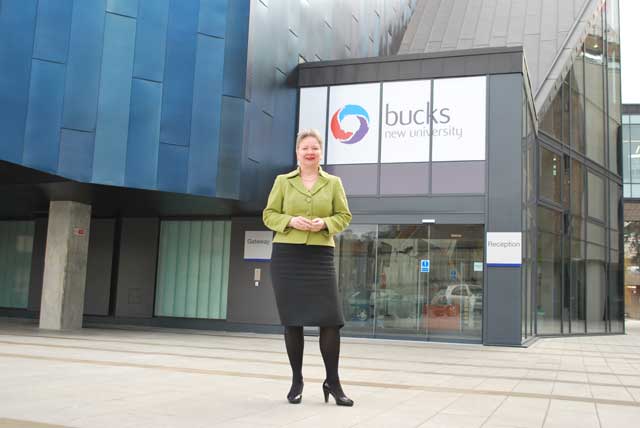Bucks New University goes into business with industry

Your support helps us to tell the story
From reproductive rights to climate change to Big Tech, The Independent is on the ground when the story is developing. Whether it's investigating the financials of Elon Musk's pro-Trump PAC or producing our latest documentary, 'The A Word', which shines a light on the American women fighting for reproductive rights, we know how important it is to parse out the facts from the messaging.
At such a critical moment in US history, we need reporters on the ground. Your donation allows us to keep sending journalists to speak to both sides of the story.
The Independent is trusted by Americans across the entire political spectrum. And unlike many other quality news outlets, we choose not to lock Americans out of our reporting and analysis with paywalls. We believe quality journalism should be available to everyone, paid for by those who can afford it.
Your support makes all the difference.When Richard Galt returned from Japan a year ago, he resolved to break into advertising. So, he applied to JWT for a traineeship. They said the 25-year-old would make a good "creative" or "planner" but that first he needed to do a Master's course at Buckinghamshire New University.
That's what he did. One year on he has completed his Master's and has a post as a trainee strategic planner at Leo Burnett, thanks to a course that gave him experience with agencies – and the crucial contacts.
This is not the kind of university that we know and love. It isn't a place where you study medieval poetry or ponder black holes. It comes a lowly 103 out of 113 in the Complete University Guide published in The Independent. Its feet are firmly on the ground, because it turns out nurses, furniture designers, and managers for the music industry.
Bucks, as it is known by insiders, is one of the newest universities in the land. Based in High Wycombe, famous for being the home of Benjamin Disraeli, it has morphed in three years from a little-known university college to a place that is becoming popular with students and doing what the Business Secretary Lord Mandelson wants. Its expansion sums up what has happened to higher education in the past 20 years.
With 9,000 students and close links with employers, it has been reorganised by a vice-chancellor who has got rid of 160 staff, replaced her senior management team, consolidated the institution onto two campuses instead of three and erected a swish £30m building for students that bristles with music and video production studios. Unlike many other universities, Bucks is now in a pretty strong position. It is not expecting to make further cuts. "We're not complacent," says vice-chancellor Ruth Farwell. "We've been controlling vacancies carefully. As academics leave we will replace, unless we need to move resources from a less to a more popular area. I'm not saying there won't be changes in provision because there are all the time, but they won't be a result of the economic climate."
The Bucks story gives the lie to claims that the entire university sector is facing cuts. Institutions that have been thinking hard about how to organise themselves are doing all right. They have healthy balance sheets and are filling courses successfully. Farwell took a hard look at all programmes in 2006 and axed one – 3D design – that wasn't attracting students.
Bucks wasn't always flourishing. When Farwell arrived, it had had its application for university status rejected. She put that right. "In my judgement, there weren't things fundamentally wrong," she says. "But it needed to be clear about what kind of university it wanted to be."
She found that Bucks had been trying to ape traditional universities by hiring people who were good at research without too much thought for what the institution was strong at. "Their recruitment didn't underpin the curriculum," she says.
"I said, 'Let's forget about trying to be traditional'. We should be working with employers to run courses that are relevant. We're not about studying subjects for their own sake. We're building a university in partnership with employers."
This relationship is so close that companies help to design the curriculum, give technical support and help with expensive equipment. Dreams, the bed company, had foundation degrees developed specifically for them.
This commitment to producing students who can get jobs and are ready for industry goes back to Bucks' beginnings as "a science and arts school". The links with local furniture companies such as Ercol and Parker Knoll were strong – and continue despite the decline of manufacturing. Bucks' furniture design Masters, like its advertising Masters, is unique and highly regarded. "Everybody is looking to us because we're still known as the place to go and do furniture," says Lynn Jones, who runs the Master's course. "That's why it's important to work with industry because otherwise industry will go and we'll go and what a shame that would be. If we lose our heritage for furniture, we'll never get it back."
Bucks has begun to hum since Farwell arrived, say academics like Paul Springer, the author of Ads to Icons, who teaches advertising. "It's exciting. We're all multi-tasking," he says.
So long as Bucks continues to be recommended by companies like JWT it shouldn't have any problems staying afloat and helping to reshape the meaning of the word "university".
Join our commenting forum
Join thought-provoking conversations, follow other Independent readers and see their replies
Comments